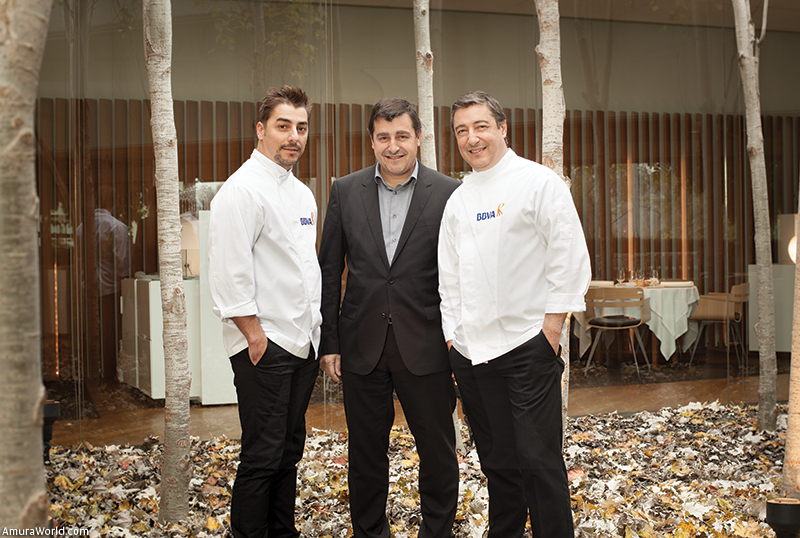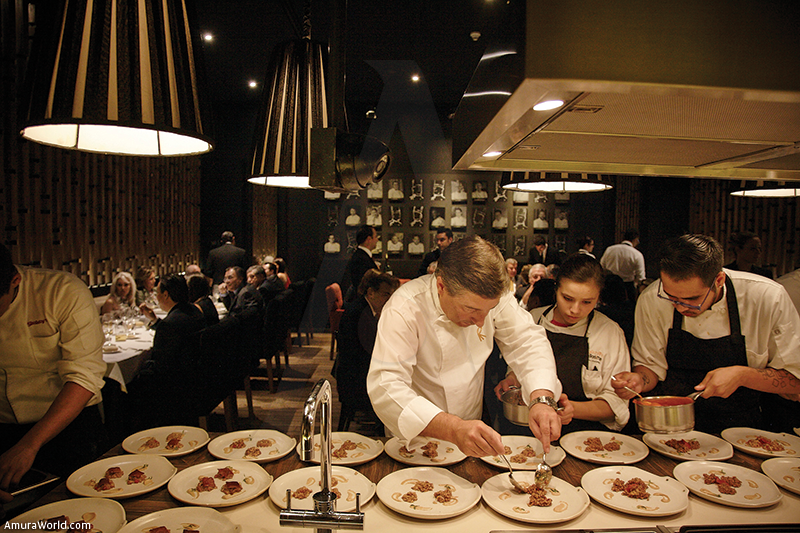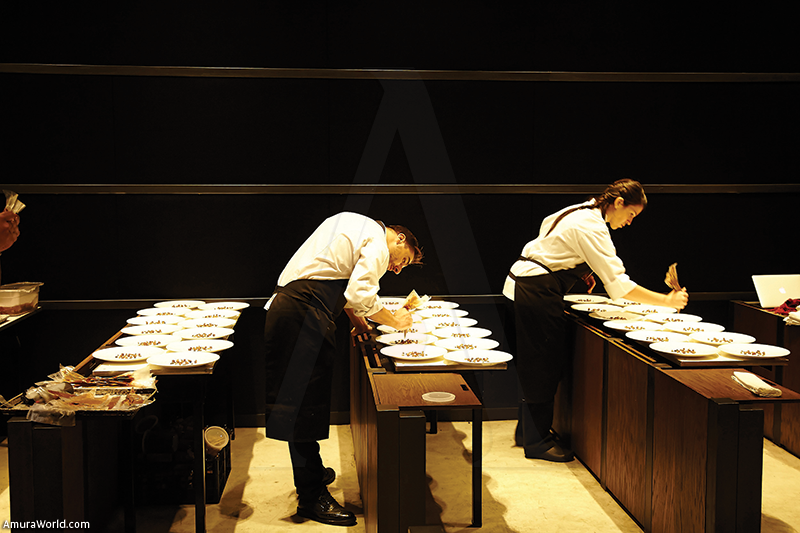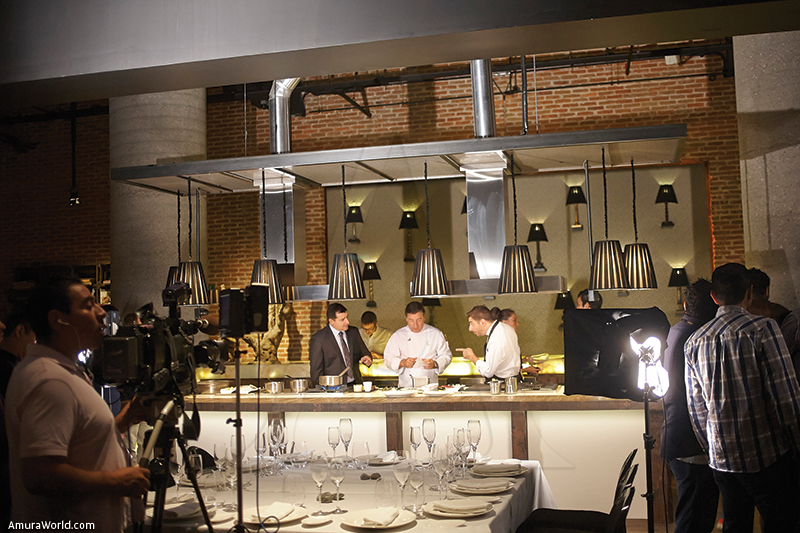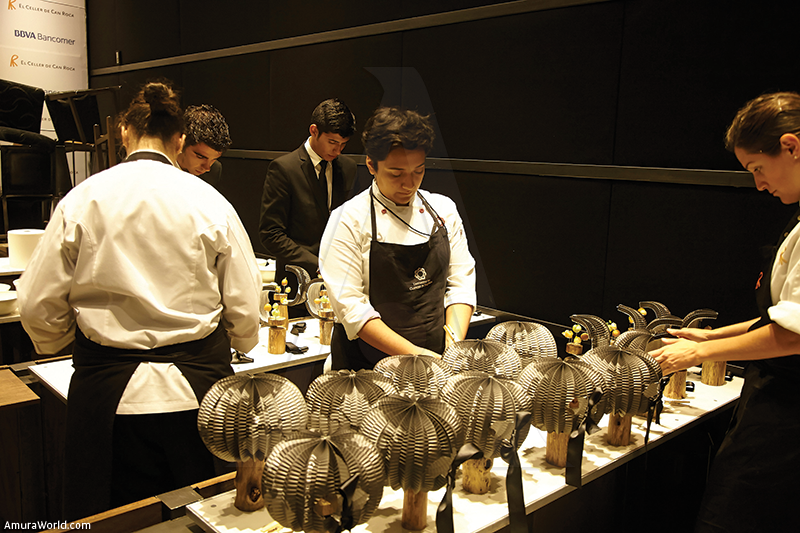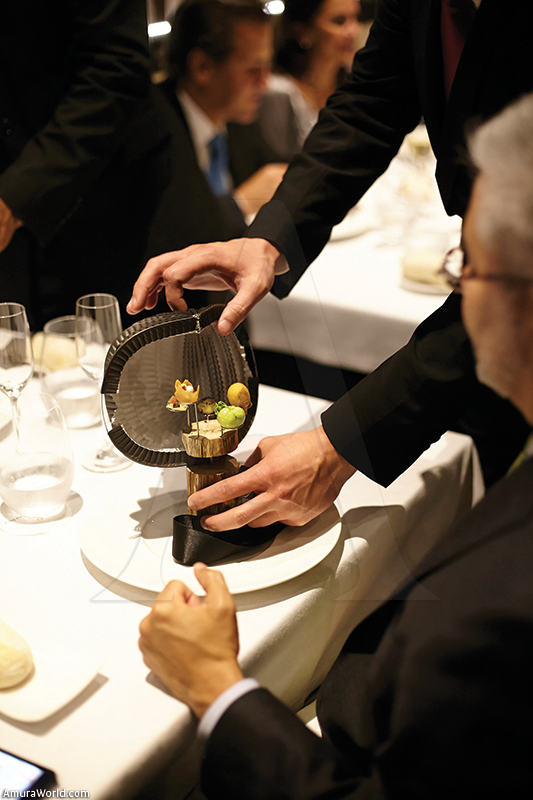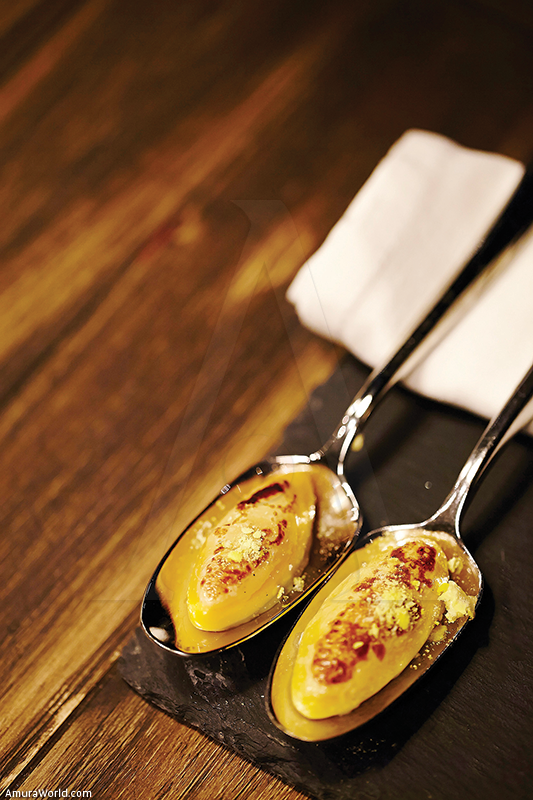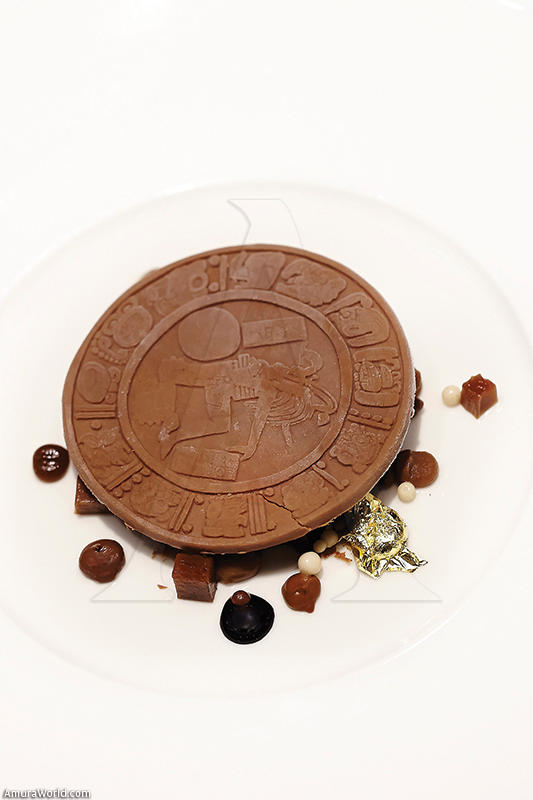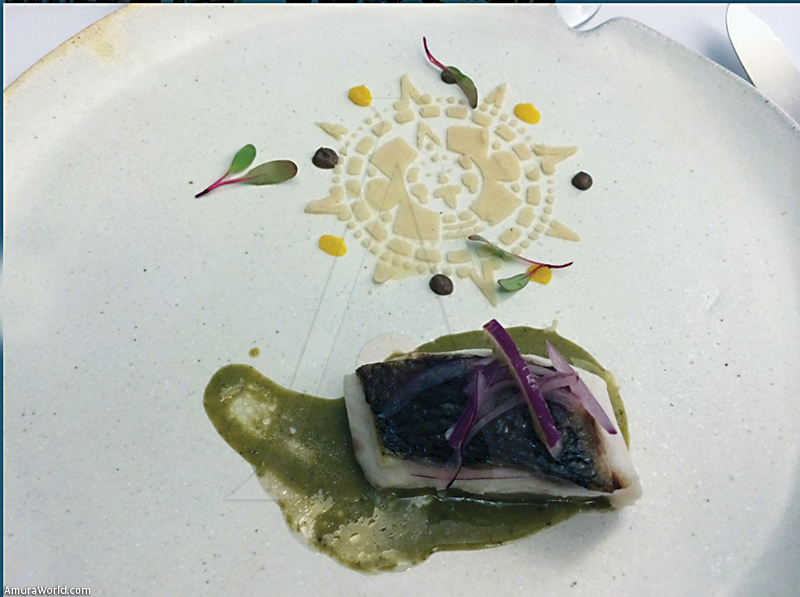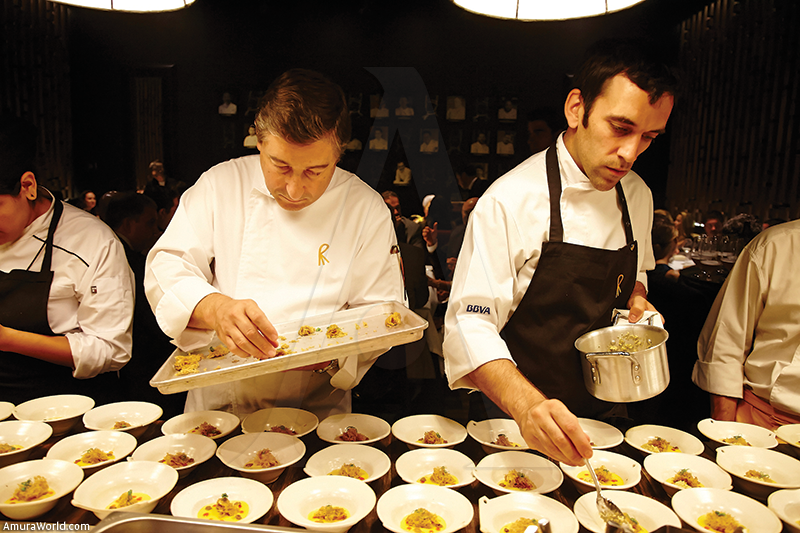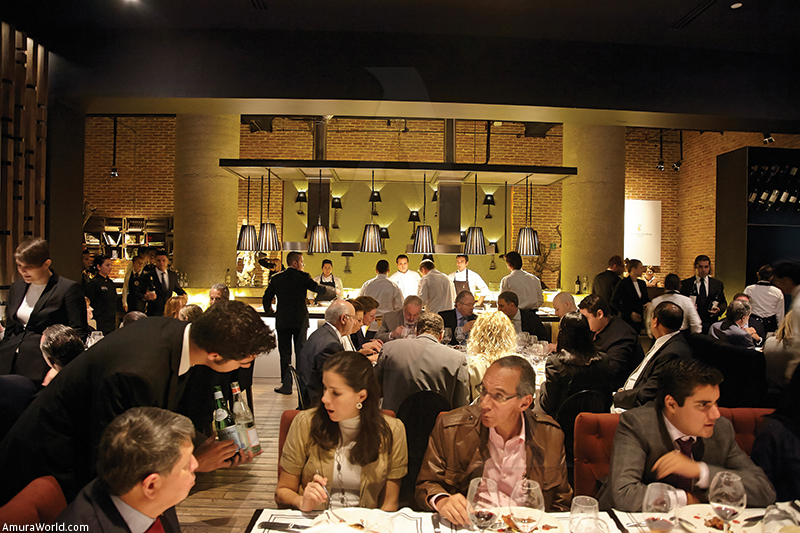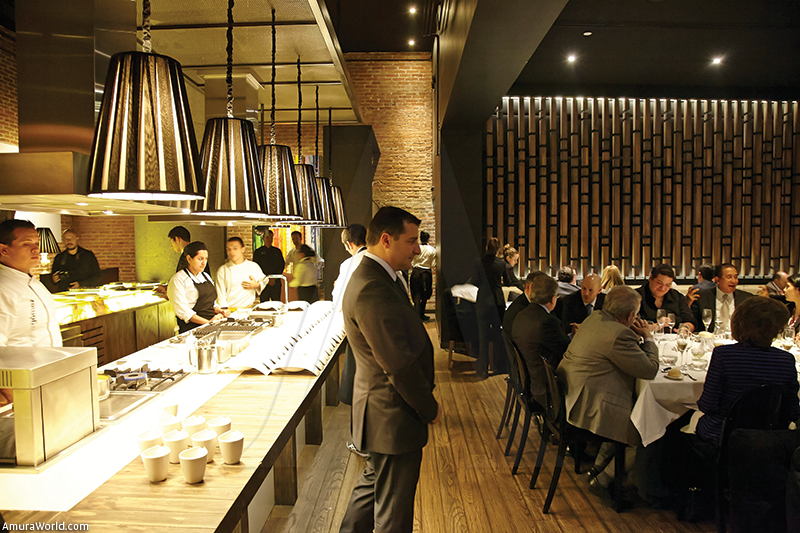The Roca Brothers and BBVA Bancomer
The restaurant El Celler de Can Roca located in Girona, Spain, appears among the best restaurants in the world, a distinction for which it was recognized as the number one in 2013, according to the classification published annually by the Restaurant Magazine. Its owners, Joan, Josep and Jordi Roca brothers; chef, sommelier and pastry chef, respectively, are the third generation dedicated to this industry. Among the ingredients they use every day to stay on top are the commitment, passion, the perseverance and innovation.
Their most recent feat was an unprecedented tour to six cities of the American continent: Houston, Dallas, Monterrey, Mexico City, Bogota and Lima; during which they had to close for five weeks their restaurant in Girona. The purpose was, on one hand, to consent the most distinguished customers from BBVA Bancomer, bringing them the best of gastronomy, and on the other hand, El Celler de Can Roca sought to make a tribute to both the kitchen of the cities visited, as well as its history; in addition to supporting the best culinary students from each country.
Amura Yachts & Lifestyle interviewed the Roca brothers to know a bit more about them and the experience of this tour in its passage through Mexico.
What motivates you carry out this tour?
Joan: Several reasons, first the fact that we passed a great time; these achievements drive us to make new things, in fact we are always looking for innovation, since the house has been against conformity. Also someone gave the possibility to fund this crazy idea of doing a tour to different parts of the world and close the restaurant for five weeks, even though El Celler de Can Roca maintains a constant demand of customers.
Evidently behind this, there is enthusiasm to learn as well to travel with the whole team to thank them for their loyalty to so many years working at the highest level. It is also a way to find inspiration in other cultures, meet new horizons and discover new ways to understand the kitchen.
What did you like most about Mexico?
Jordi: Everything, Mexico is an amazing country with a vast culinary culture; each small region has its own specialty and does not give you enough time to know it completely. We loved to enter the world of the chiles and understand it, not as spicy, but as an aromatic nuance that can give a great depth. I love chocolate, a product very Mexican and departing from this, the moles.
Joan: We feel envy of Mexican kitchen and its great diversity; it is very difficult to define, there are numerous Mexican cuisines, in every city, every town. Every corner has its cuisine, its charm, its diversity and its complexity, that is the most fascinating of this country.
Talking about chiles...
To what do you call its nuances?
Jordi: The first impression of taste, that one that is always stimulating and spicy. Some are drier, others more acid, smoked or scented.
Would it be like when a painter is expressed in a work of art?
Joan: Yes, of course, in the color it is the diversity, the subtlety of its tones and nuances. With chiles something similar happens, there are different kinds of tastiness of the same flavor that is changing and ends up giving total different sensations.
How does Mexico influence in the creation of new dishes?
Joan: As an example we are making versions of the Mexican mole. This comes from the fascination we have it. At the end it is more than a dish, it is the mission statement of a baroque cuisine; the Mexican mole is a synthesis of a complex cuisine.
We started making moles and versions of mole at our style, not for having come to Mexico, but inspired by the film “Como agua para chocolate”. We cooked for example quail with roses, with strawberries, with mole and with chocolate. You have to be aware how Mexican food can also inspire from that perspective, from the cultural part of a film or a novel as the one written by Laura Esquivel.
Once in Mexico we have known more about moles and we took with us some dried chiles and try to reinvent some dishes like tortitas de tinga, cochinita pibil and a corn velouté with Oaxaca cheese. Also we tried with things we had seen and tested here; we don’t intend to replicate dishes, but to create our own version. That’s our role, preparing Mexican food with Mexican products, but at the end we ended up with a very Mexican cuisine version; we try to imagine how it would be El Celler de Can Roca here.
The dishes you create contain a lot of symbolism, could you tell us about it?
Josep: The symbol is a tribute, a wink and respect for different traditions. With all humility, has to do with that way of paying tribute to the culture and the pre-hispanic beliefs.
What has been the biggest challenge of this tour?
Joan: The logistics, the arrangement of all the necessary things, thinking how we could make this possible at a practical level, to be in places where we could have all the necessary facilities and infrastructure. And also the great challenge that we had to think as Mexicans, Colombians and Peruvians to make a menu that they liked, perhaps this was the biggest challenge. And doing this with prior sufficient knowledge, but the truth is that when you arrive there you realize you know nothing and there is still much to learn.
Is there a discovery from this tour that enriches the way you cook?
Joan: We get a lot of things, especially experiences, flavors, aromas and products that surprise us with results and conclusions we did not know.
What do you want to convey in each of the dishes?
Jordi: Flavor, happiness and when people taste them, in every place we have been, they can identify them as theirs; even if the dishes have been made using a different technique, they can recognize their flavors.
Jordi, you mentioned that the chocolate is the best dessert, why?
Jordi: It is ancestral and a very simplest dessert and the base for any cake, mole shop and part of the kitchen; It is a very complex element that part of two products: cocoa and sugar, and depending on its process it can take a very different intensity. It is such a simple product, and yet so complex that to me is magical. Definitely I would recommend it as part of any menu.
Are you aware of the alchemy and the energy that you use to create each of your dishes?
Joan: Of course the kitchen is that. The kitchen is a language, is a way of telling things, and to do that, words or letters are needed; which in this case are the products, and we try to find the connection and the balance that will succeed in building the phrases that end up counting something.
What was the selected wine for Mexico?
Josep: We have made an assembly between what it is our land and try to combine it with Mexican customs, so we have brought four wines that will continue to accompany us in the tour. But especially in Mexico we have incorporated wines from Baja California, handcrafted beer and mezcal; we have cooked with tequila being rested or aged and finish even with pulque.
Josep, what do you call a turn over to the success, and how knowledge is expanded when this happens?
Josep: The situation right now for us is very privileged, breaking borders, stiffness and that getting out of areas that had become stable. What we have been looking for is to interpret our creative process again and starting from scratch with other ingredients in other areas, and this always serves as a great encouragement, is a creative stimulus, which serves our team and us. Changing the central concept of knowledge gives another perspective. In fact, in Mexico we have tried to be open, not only from the point of view of knowledge, but also to feel on edge what it represents the Mexican culture.
Every how much the Roca brothers have been reinvented?
Joan: We have 27 years of growth and will continue growing with the same obsession of pose new challenges. So we are open to all possibilities, with a very powerful approach to interdisciplinary level and we will continue to grow indoors, but also with the ability to show to be open to the fusion for this that symbolizes the gastronomic culture of the world
Is there a dish that represents Girona for you?
Jordi, Josep and Joan: Yes, a lot of.
Joan: But we could not choose one, the truth is that we are fortunate to live in a place and a province with a wonderful territory with a great geographical and climatic diversity and at the same time with a large amount of products that gives us the possibility to make many different dishes and each of them could represent Girona.
But you are changing them?
Joan: Yes, they are changing depending on those products, if they are available or don’t, because they are very temporary in our zone.
Josep: People who comes here get surprised by that combination of sweet and salty, from the sea and the mountain which is something deeply established in our country and that is sometimes seen as an innovation. For us it is also a sign of respect to the kitchen of the grandmother.
Vanilla, as you said, it is not a question of intensity, but of depth, what does that mean?
Jordi: The vanilla flavor it is a flavor that will not bore you, vanilla is magical, it takes a long time to disappear from your mouth. The concept is to put a lot of vanilla flavor, with the combination and the correspondence of flavors and to create a new flavor from others.
What wine and food matching do you recommend with the dessert of vanilla?
Josep: In this case, a pulque of oats with cinnamon and vanilla, something that links itself with the drinking in the neighborhood, the historical drink of generational transmission.
Innovation is something you have in common with BBVA Bancomer. What has been the experience of this relationship?
Josep: The truth is that it is a similarity in which there were initially only complements of innovation, rigor, discretion, of a work to the shade, of a work of vocational service, and as we have the opportunity to meet the people behind that image, we have the sensation of feeling protected, pampered, cared for, being able to go on the same line in the same direction and also find people with stimuli very similar to ours, with a philosophy very similar to ours, and in what represents the customer service and in any case focus in all people who is behind with us, supporting us as friends.
What do you want to transmit to each of the countries where you have selected some chefs to obtain a scholarship?
Joan: What we want is to support, assist, encourage, be able to take these guys to our home, to be able tell them what do we do and how and why we do it. That we can open doors to everything that is happening in El Celler de Can Roca, so this will complement their academic training. I think then that these scholarships are somewhat important because they give them the opportunity to something that perhaps they could not have, due to everything that represents to be traveling and move to another country, and thus they can do it so. This is another sense of this tour, since we have been linked to the training.
The Roca brothers conclude with their desire for coming back to Mexico in search of a new inspiration, and point out: “We’re looking forward to come back and we are already seeing when to do it”.
Text: Gisselle Morán ± Photo: BBVA Bancomer

